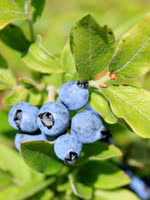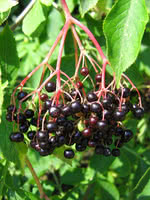Mon-Fri 9am - 5pm Mountain time
Common Blueberry vs Black Elderberry
Vaccinium myrtilloides
Sambucus canadensis
NOT AVAILABLE THIS SEASON - MIGHT RETURN
NOT AVAILABLE THIS SEASON - MIGHT RETURN
Common Blueberry is an August maturing berry that is wonderfully flavorful and contain more antioxidants by volume than the highbush varieties.
They'll give your baked goods a wonderful pop of flavor.
It isn't as large, pretty, or high yielding as the other varieties we carry. But Common Blueberry is one of the only blueberries that will survive in plant hardiness zones 1A to 2B.
Note: Blueberries require very specific soil conditions. They need well-drained soil with a pH between 4.5 and 5.0.
Black Elderberry is a deciduous shrub native to eastern North America. You can plant this shrub in moist areas and it will help stabilize your soil. You can also use it on rural properties anywhere you'd use a lilac.
Black Elderberries are considered to be partially self-pollinating. So while they will still produce some berries without cross-pollination, planting with another variety will increase yields. Consider planting with Ranch Elderberry or Bob Gordon Elderberry.
Warning: the seeds, stems, leaves, roots, and uncooked berries of the Black Elderberry are poisonous to humans when eaten in quantity. You should cook the berries to make them safe for human consumption.
Common Blueberry Quick Facts
Black Elderberry Quick Facts
Toxicity: leaves, stems, and uncooked berries are poisonous to humans

